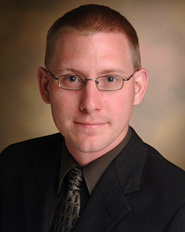
Alan Theisen (b. 4 October 1981; Port Huron, Michigan) is a Ph.D. graduate assistant in the Department of Music Theory at the Florida State University.
Composing since the age of sixteen, he has produced a steadily growing body of work distinguished by its musical energy and concentration of expression.
Representative works by Theisen include a Sonata for Alto Saxophone and Piano, Variations on a Theme of Gretchaninov, Eclogue for flute, and the Concerto for Alto Saxophone and String Orchestra (premiered by soloist Lawrence Gwozdz and the Szczecin Philharmonic in 2004). Recent compositions and commissions include Ritorno for flute and cello and a Triple Concerto. Noted composer Dimitri Terzakis commends Theisen's oeuvre as being "the product of a unique talent."
As a saxophonist, Theisen has toured the United States and Canada with the Sax-Chamber Orchestra, performing at two World Saxophone Congresses (Montreal - 2000, Minneapolis - 2003). He studied the instrument with internationally-recognized performer Lawrence Gwozdz and participated in masterclasses with famed saxophone pioneer Jean-Marie Londeix. No stranger to the podium, Theisen has been a guest conductor with several ensembles.
In an effort to showcase both his own original compositions and pieces by other contemporary composers, he founded the Intégrales New Music Festival in 2005. Now an annual event, Intégrales NMF features world-premiere performances by nationally recognized musicians. Intégrales has expanded to include musical collaborations with artists, authors, and dancers.
Theisen wrote his undergraduate thesis on György Ligeti's Piano Etudes, and has authored several papers on topics including Elliott Carter, film editing, composition as analysis, and Michael Brecker.
Other interests include mathematics, film criticism, and philosophy; in addition, Theisen has performed the role of Oberon in a production of Shakespeare's A Midsummer Night's Dream, for which he also wrote the incidental music.
Theisen lives with his wife (and puts up with their two cats) in Tallahassee, Florida.
|
|
|
|
|
|

Friday, November 11, 2005
New York, New York
In one week, my wife and I will be flying to New York City for our honeymoon; this is a unique situation, as neither of us have ever been to the famed city. (I once drove past it on a road trip back from Montreal, but that's a different story.)
I know it will be unavoidable, but I'd really like for us not to look like complete tourists. Can anyone advise us with things to do or see (or not to do or see) while we vacation? We will be seeing the Met Opera doing Carmen, viewing a taping of the Conan O'Brien show, skating at Rockefeller Center, wandering through the Guggenheim museum, and checking out the Macy's Thanksgiving Day parade. Where should we eat?
Speaking of my wife, Misty will soon be recording my solo flute work Immer Fließend so that I may post it in the listening room. I'm looking forward to finally tacking something up for people to cringe at.....I mean, critique......I mean, listen to.
posted by Alan Theisen
Thursday, November 10, 2005
Sessions
"American music is convention-ridden as has been that of no other modern nation... The prevalent attitude towards music... is that of the late nineteenth century. Our standards are very largely external ones. We demand music that, whether "programmatic" or not, is evocative rather than inwardly expressive...Our musical life is propaganda-ridden.
"[Composers] must learn to write music... which has been a real, important, and primary experience to them. Music so produced will vary in quality, as individuals vary; it will vary in style and form, with the immense variety of America itself. But it will embody the authentic accents and gestures of American individuals. And what other Americanism do we want, or can we demand, in our music?"
- Roger Sessions, "No More Business-as-Usual" (1942)
posted by Alan Theisen
|
| |



